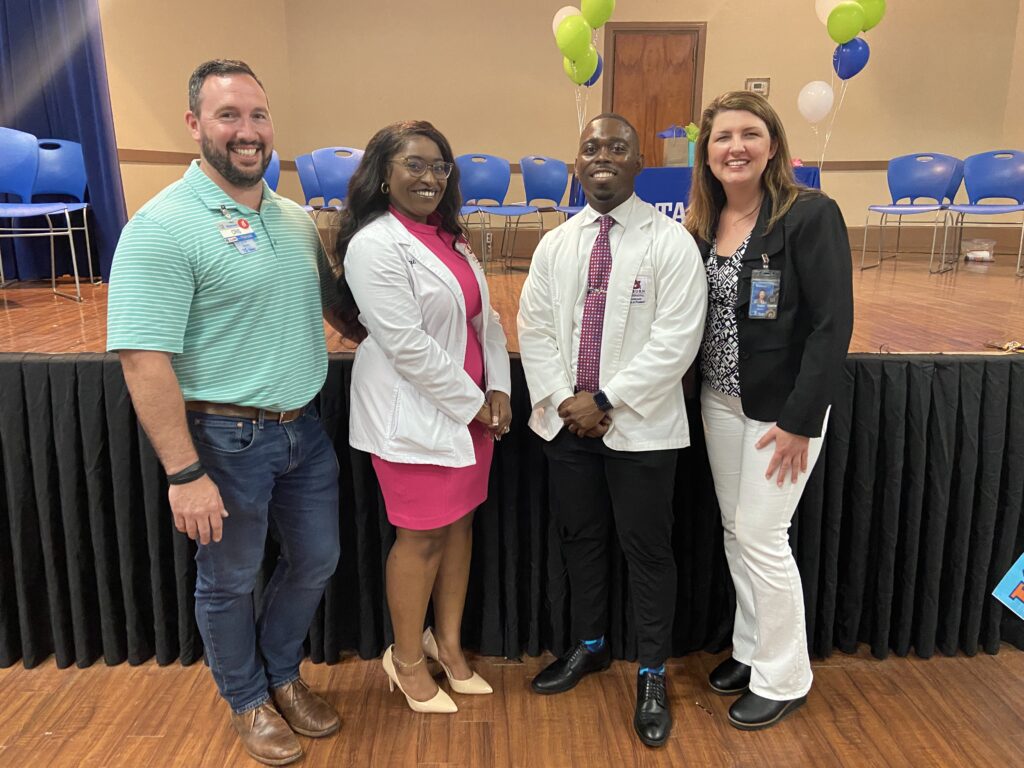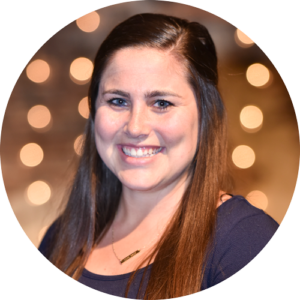By Javacia Harris Bowser
When Micah Grey and Joi Chinakwe were students at Tuskegee University they made serving the community of Macon County, where the school is located, a top priority. While they were volunteering they became more and more aware of how detrimental health illiteracy and a lack of access to adequate healthcare can be.
“We spent four years in Macon County, so we got to see or had a little window into what the actual residents were going through as far as being underserved,” Joi says. “I can’t tell you how many times I’ve had to either drive to Montgomery or Auburn to sit with friends in emergency rooms.”
That’s why Micah and Joi, now students at Auburn University’s Harrison School of Pharmacy, were eager to use their Albert Schweitzer Fellowship to address health inequity. They worked with the Junior Healthcare Leaders of Alabama initiative to increase health literacy within adolescents in the rural Alabama community of Notasulga. Their goal was to boost health information comprehension and career readiness.
Through a partnership with the Tuskegee-Macon County Community Foundation, Micah and Joi worked with the NHS Blue Devil Nation 21st Century Community Learning Center to offer a special afterschool program to select students ages 12 to 16.




The students were taught how to prevent and manage diseases such as hypertension and diabetes, how to respond to medical emergencies, and they were also introduced to various healthcare-related careers. The hope is that if these students can improve their health literacy, they can have a positive impact on their families today and if they grow up and enter the healthcare field, they could impact their entire community in the future.
The students were encouraged to dream big as Micah and Joi guided them through creating vision boards, writing affirmations, and journaling about their goals.
Boosting emotional intelligence was also a part of the program. At the start of each session, students were asked to pick a color to describe their day.
“And once they pick their color of the day, they will have to explain why they chose that color,” Joi explains. “We were helping them to not only advocate for their emotions, and to advocate for themselves, but we were also teaching them how to assess your own emotions and how to reflect on how you feel and put those into terms where other people will be able to understand how you’re feeling.”
Micah and Joi feel they’ve learned as much as their students have.
“We learned a lot about planning and lesson planning and what works with kids what doesn’t work with kids,” Micah says. “I’ve always had a passion for giving back to kids and being that example for kids, especially those that might not have someone or know someone that is going to college or simply they just don’t know things about college.”
Micah says he wants to be the one to introduce these students to different opportunities such as 4-year colleges, 2-year schools, grants, and scholarships.
Micah, a Birmingham native, currently is interning at the Walmart pharmacy in Tallassee, Alabama, and hopes to build a career serving as a pharmacist in rural communities.
“I like being that advocate for those patients, when it comes to talking with the doctors and getting in touch with their insurance and helping them find different discount programs that help them be able to afford all of their medications,” he says.
His internship also requires him to simplify complex health issues for patients, something he got plenty of practice with during his ASF program with the kids in Notasulga.
“There are rewards when you stick through something.”
After completing the program, the students were rewarded with a white coat ceremony. Thanks to the help of Walmart pharmacy, the kids also received health care bags that included blood pressure cuffs, stethoscopes, puzzle games, and more.
“We wanted to let them know that they’re appreciated and that there are rewards when you stick through something,” Joi says.
Even though Micah and Joi’s project has concluded, their efforts to raise up healthcare leaders in rural Alabama have not.
They are working to establish an organization of healthcare students on Auburn’s campus who will continue to mentor middle and high school students in surrounding areas. And they hope that one day this effort will expand to other schools such as their alma mater Tuskegee University, Auburn University – Montgomery, and Alabama State University.
And while Joi and Micah were helping to develop future healthcare leaders, they were getting plenty of professional development too.
“Ultimately the Fellowship will help us be better pharmacists,” Joi says. “Us being able to practice and do this with the students, it helps us to communicate to our patients.”
Joi, a Montgomery native, hasn’t decided exactly what she wants to do after pharmacy school, but ASF has given her a bit of clarity.
“It introduced me to my passion for teaching,” Joi says. “As long as I can enter a career where I am a warrior princess for pharmacy and a warrior princess for the underserved, I’m okay with it.”

